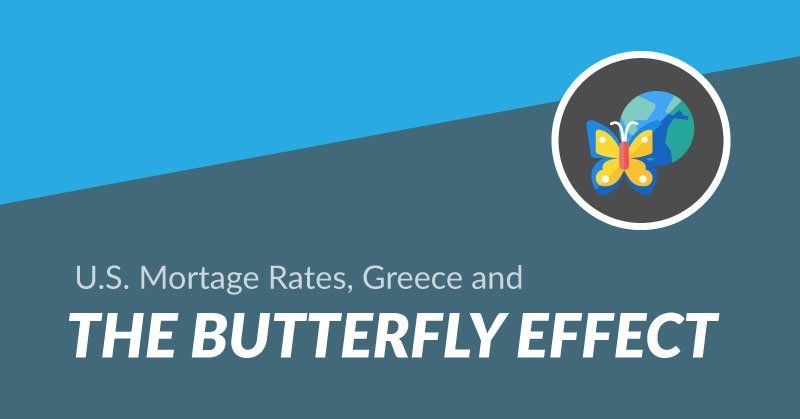
"Everything is deeply intertwingled." Theodor Holm Nelson Intertwingled is a great word to use to attempt to describe how world news impacts mortgage interest rates. If you want to hear the full explanation from a mortgage industry expert of how Greek news impacts mortgage rates, listen to Barry Habib below. The man knows his stuff. In terms that are a little simpler, here is the gist of the story about why Greek bailouts and other far away news might impact the mortgage interest rate you pay: Point 1: Investors Don't Love Unpredictability When people have money (lots of money) they want to invest it to earn more money of course. But they also don't want that money to 'go away', so security is a concern. Unpredictability is not the friend generally speaking of security. The situation in Greece is unpredictable. Bond holders (people who lent Greece money) are not getting paid back, which irritates them of course. So they have been telling Greece "hey, buckle down and get your house in order. You need to quit spending so much of our money and get on track.". However the Greeks are not very fond of these 'austerity measures' and recently voted down cooperating with foreign lenders and investors by a 2 to 1 margin. In short, Greece did this to investors:  Point 2: Investors will move their money from a less certain to a more certain location at some point So when faced with uncertainty like this, what do investors do? They move their money, at least until things calm down. This phenomenon even has a name, the 'flight to quality'. Investors move their money to less risky, higher quality investment options. Point 3: U.S. bonds are viewed as 'safe' by investors We live in the U.S. and sometimes it seems like things are not all that well handled in terms of managing our own finances. But things are relative, and while we may need to clean up our act, from an investors perspective, we have our act together more than Greece in this situation. So money begins to move to the U.S. for safety. Point 4: When more money floods into U.S. bonds, mortgage rates tend to drop. The higher the demand for U.S. bonds is, the lower the interest rate our government has to offer to bond holders. Investor are more concerned about security (getting their money back) than they are about return (how high the rate is), so they will accept a lower interest rate. So when money floods into the U.S., bond rates tend to go down. And for reasons that go well beyond this brief post, when U.S. Treasury bonds go down, mortgage rates tend to follow in step. Conclusion: When money flees foreign investments for safe haven in U.S. bonds, mortgage interest rates tend to fall. Most of the time. Nothing is certain. All we know for sure is that things are deeply 'intertwingled'.
Point 2: Investors will move their money from a less certain to a more certain location at some point So when faced with uncertainty like this, what do investors do? They move their money, at least until things calm down. This phenomenon even has a name, the 'flight to quality'. Investors move their money to less risky, higher quality investment options. Point 3: U.S. bonds are viewed as 'safe' by investors We live in the U.S. and sometimes it seems like things are not all that well handled in terms of managing our own finances. But things are relative, and while we may need to clean up our act, from an investors perspective, we have our act together more than Greece in this situation. So money begins to move to the U.S. for safety. Point 4: When more money floods into U.S. bonds, mortgage rates tend to drop. The higher the demand for U.S. bonds is, the lower the interest rate our government has to offer to bond holders. Investor are more concerned about security (getting their money back) than they are about return (how high the rate is), so they will accept a lower interest rate. So when money floods into the U.S., bond rates tend to go down. And for reasons that go well beyond this brief post, when U.S. Treasury bonds go down, mortgage rates tend to follow in step. Conclusion: When money flees foreign investments for safe haven in U.S. bonds, mortgage interest rates tend to fall. Most of the time. Nothing is certain. All we know for sure is that things are deeply 'intertwingled'.









